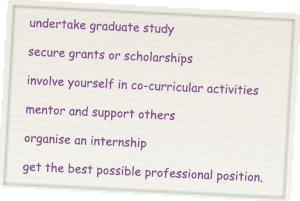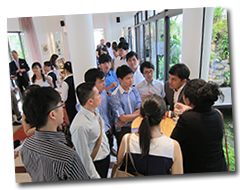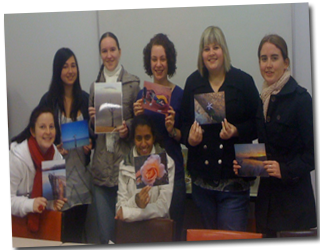Networking & Building on Experiences
You may think that your international experience is over. Okay so you’ve come through customs, and you may be back in your old bedroom or unit, but that doesn’t mean that the significance of what you’ve done is finalised.
Building
| What Next? |
In the video, Jan Gothard talks about bringing the learning home and things to consider to build on your international experiences. |
| Reflection |
How can you build on your international experience? What opportunities exist personally, academically and professionally? |
New Opportunities
-

Many students maintain connections through social media such as Face-book. To stay connected to your host country, you could:
- Put an electronic newspaper on your feed reader
- Follow prominent organisations in your field on social media
- Stay in touch with new movies or music from your host country
-

Your broader experiences of the world and your personal growth can also bring new benefits for you at home. Your time away is a great springboard to new opportunities …to build upon your experiences in new ways.
-

Many of the students and new graduates who were interviewed for this website had given a presentation or written a testimony once they returned to their home campus. They said that it helped them make sense of their experiences and explain the value of those experiences to friends and future employers.
What past students say
-

An interview with Emma
Emma is a final year Arts and Education student, with majors in Spanish and Drama. She recently returned from a student exchange in Columbia. Here she talks about the extra-curricular opportunities she has taken up since returning home in order to build her skills, abilities and experiences.
I really wanted to nail this job interview. I wanted to just blow them away and give them no other option than to hire me. So I did a focus group. I got a bunch of friends and we just did a focus group on cider - which was the job that I was going for - because I saw myself as inexperienced compared to the other candidates that would be going for that role. So at the interview I showed them the stuff that I'd done. Then I got a call a week later with a job offer.
Morgan, Law and Business Graduate
Networking
-

Without a doubt, the most important professional skill, advocated by students who have studied abroad, is networking. Connecting and building relationships with others is an important aspect of each phase of the international experience: .
-

Networking can be a useful and practical demonstration of the employability skill of communication. If you can develop networks within your chosen field of interest, you might find access to greater employment opportunities. So it is important to keep networking when you return from abroad. The important thing to remember is that networking is a reciprocal process. You need to think about how you can help others as well as how they can help you..
What past students say
-

An interview with Katie
Katie recently completed a Business degree. While studying, she undertook three separate international programmes in East Asian countries. At the time of her interview, Katie was working in a government department on projects that required continuing engagement with the Asian region. Listen to Katie talk about how she continued to build her networks after she returned home.
